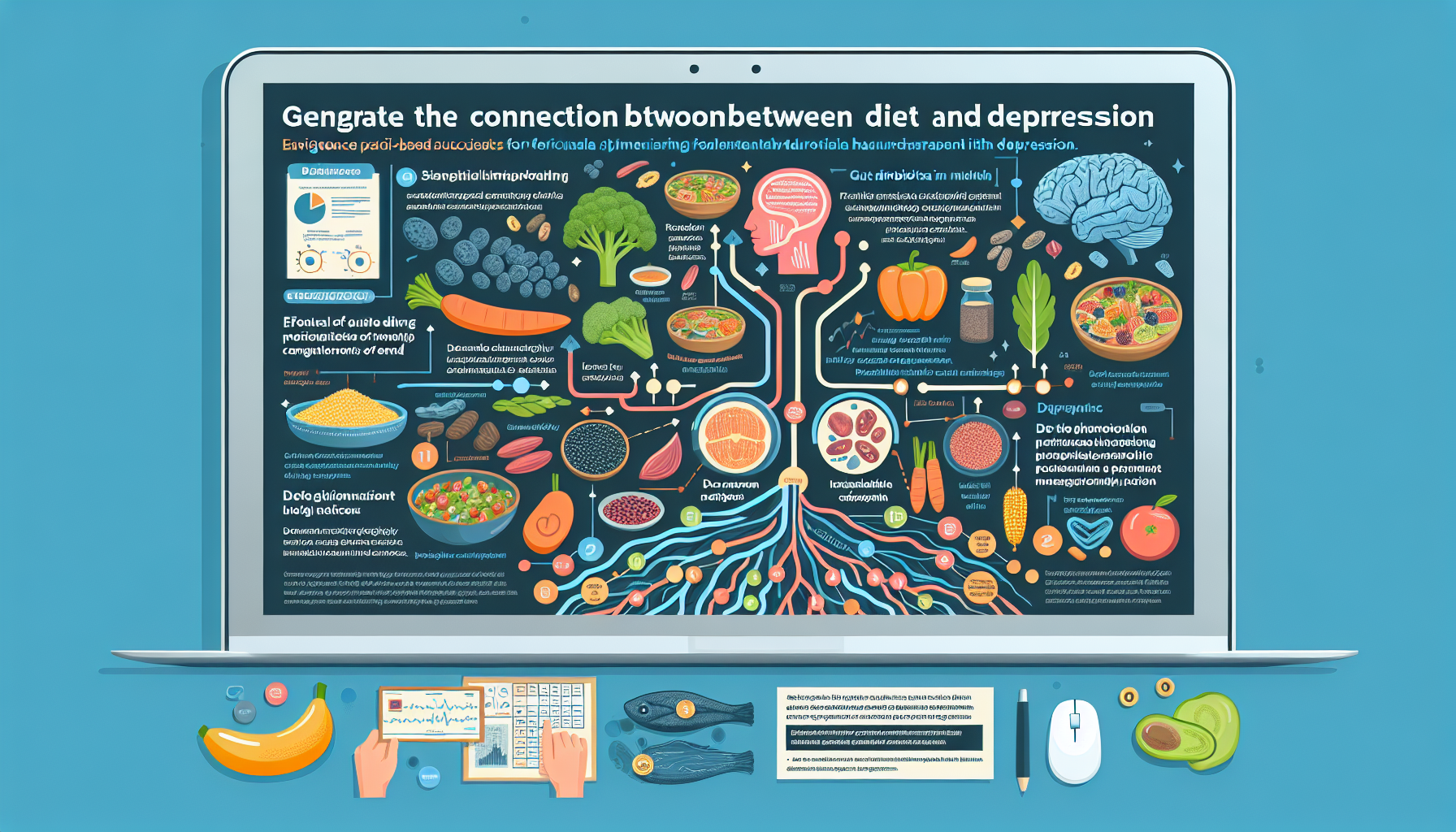Have you ever wondered if the food you eat could have an impact on your mental well-being? Well, recent scientific studies suggest that there may indeed be a connection between diet and depression. In a study published in the Public Health Nutrition journal, researchers found that a diet rich in fruits, vegetables, whole grains, and lean proteins was associated with lower rates of depressive symptoms. Another study published in the American Journal of Clinical Nutrition revealed that a Mediterranean-style diet, which includes olive oil, fish, and nuts, was linked to a reduced risk of depression. These findings provide fascinating insights into the potential influence of our dietary choices on our mental health. So, let’s explore this intriguing topic further and uncover the possible link between diet and depression.
Discover the Ultimate Weight Loss Secrets Here!
The Impact of Diet on Mental Health
Introduction to the connection between diet and mental health
When it comes to maintaining good mental health, we often think about therapy, medication, and self-care practices. However, one important factor that is often overlooked is our diet. Believe it or not, what you eat can have a significant impact on your emotional well-being and even the development of mental disorders such as depression.
Exploring the role of diet in maintaining emotional well-being
There is growing evidence suggesting a strong connection between our diet and our mental health. The foods and nutrients we consume play a vital role in the production and regulation of various neurotransmitters in the brain, which are crucial for maintaining emotional well-being.
Research has shown that deficiencies in certain nutrients can lead to impaired brain function and an increased risk of mental health disorders. Conversely, a healthy and balanced diet that provides all the necessary nutrients can help support optimal brain function and protect against the development of mental health issues.
Understanding Depression
Defining depression and its symptoms
Depression is a mental health disorder characterized by persistent feelings of sadness, loss of interest in activities, changes in appetite or weight, difficulty sleeping or oversleeping, low energy levels, feelings of guilt or worthlessness, and in severe cases, suicidal thoughts. It is vital to recognize that depression is a real and debilitating illness that affects millions of people worldwide.
Prevalence and global impact of depression
Depression is a prevalent mental health condition that affects people of all ages and backgrounds. According to the World Health Organization, over 264 million people worldwide suffer from depression, making it a leading cause of disability globally. It not only impacts individuals but also has a significant economic burden on healthcare systems and society as a whole.
Current treatment approaches and limitations
The treatment of depression typically involves a combination of psychotherapy, medication, and lifestyle changes. However, these treatment approaches do not work for everyone, and there is a need for alternative and complementary strategies to improve outcomes for individuals with depression. This is where understanding the potential link between diet and mental health becomes crucial.
Click Here for Proven Fat-Burning Strategies!
Exploring the Potential Link
Recent scientific studies investigating the diet-depression link
In recent years, there has been an increasing number of scientific studies exploring the relationship between diet and depression. One study published in the journal BMC Medicine found a significant association between a diet high in processed foods, sugary snacks, and sweetened beverages and an increased risk of depression. Another study published in JAMA Psychiatry indicated that a Mediterranean-style diet may lower the risk of developing depression.
Overview of study methodologies and sample sizes
These studies utilized a variety of methodologies, including longitudinal studies, cross-sectional surveys, and randomized controlled trials (RCTs). The sample sizes ranged from small cohorts to large-scale population studies, allowing researchers to gather valuable insights into the potential link between diet and depression across diverse populations.
Findings suggesting a correlation between diet and depression
The findings of these studies consistently suggest that there is a correlation between diet and depression. Diets high in processed foods, refined sugars, and unhealthy fats are associated with a higher risk of developing depression, while diets rich in whole foods, fruits, vegetables, lean proteins, and healthy fats show a potential protective effect against depression.
Nutritional Factors Affecting Mental Health
Role of macronutrients (carbohydrates, proteins, fats)
Macronutrients, namely carbohydrates, proteins, and fats, are essential for providing energy and supporting various bodily functions, including brain function. Each macronutrient plays a different role in mental health:
- Carbohydrates are the primary source of energy for the brain and help regulate mood by increasing the production of serotonin, a neurotransmitter associated with happiness and well-being.
- Proteins are crucial for the synthesis of neurotransmitters and play a role in regulating mood, cognition, and behavior.
- Fats, especially omega-3 fatty acids, are important for proper brain development and function, and deficiencies in omega-3s have been linked to an increased risk of mental health disorders.
Importance of adequate intake of essential micronutrients
In addition to macronutrients, essential micronutrients, such as vitamins and minerals, are necessary for optimal brain function and mental health. Studies have shown that deficiencies in micronutrients like vitamin B12, vitamin D, folate, magnesium, and zinc can contribute to the development of depression and other mental health disorders. Therefore, it is crucial to consume a diverse range of whole foods to ensure an adequate intake of these essential micronutrients.
Effects of consuming high levels of sugar and processed foods
Consuming high levels of sugar and processed foods has been linked to both physical and mental health issues. A diet high in refined sugars and processed foods can lead to inflammation, oxidative stress, and disruptions in gut health, all of which have been associated with an increased risk of depression and other mental health disorders. It is important to be mindful of our intake of these foods and focus on whole, unprocessed options instead.

Unlock Your Path to a Healthier You!
Mediterranean Diet and Mental Well-being
Overview of the Mediterranean diet
The Mediterranean diet is inspired by the traditional dietary patterns of Mediterranean countries, such as Greece and Italy. It emphasizes the consumption of fruits, vegetables, whole grains, legumes, nuts, seeds, olive oil, fish, and moderate amounts of dairy and red wine. This dietary pattern has been consistently associated with numerous health benefits, including improved mental well-being.
Research supporting the positive impact of the Mediterranean diet on mental health
Several studies have highlighted the positive impact of the Mediterranean diet on mental health, particularly in relation to reducing the risk of depression. One study published in JAMA Psychiatry found that adherence to a Mediterranean diet was associated with a lower risk of developing depression over a four-year period. Another study published in Molecular Psychiatry concluded that a Mediterranean-style dietary pattern was associated with a lower prevalence of depression and anxiety.
Benefits of specific Mediterranean diet components (olive oil, fish, fruits, etc.)
Various components of the Mediterranean diet have been individually linked to mental health benefits. For example, olive oil, with its high content of monounsaturated fats and antioxidants, has been shown to reduce inflammation and improve brain health. Fish, specifically those rich in omega-3 fatty acids like salmon and sardines, have been associated with a lower risk of depression. Fruits and vegetables, with their abundance of vitamins, minerals, and antioxidants, provide essential nutrients for optimal brain function and mental well-being.
Impact of Omega-3 Fatty Acids
Introduction to omega-3 fatty acids
Omega-3 fatty acids are a type of polyunsaturated fat that is crucial for overall health, particularly brain health. There are three main types of omega-3s: eicosapentaenoic acid (EPA), docosahexaenoic acid (DHA), and alpha-linolenic acid (ALA). EPA and DHA are mainly found in fatty fish, while ALA is found in plant-based sources such as flaxseeds, chia seeds, and walnuts.
Studies linking omega-3 fatty acids to reduced risk of depression
Numerous studies have suggested a potential link between omega-3 fatty acids and a reduced risk of depression. For example, a meta-analysis published in JAMA Psychiatry analyzed the results of 13 studies and found that higher omega-3 intake was associated with a decreased risk of depressive symptoms. Another study published in Translational Psychiatry showed that omega-3 supplementation improved symptoms in patients with major depressive disorder.
Potential mechanisms behind the antidepressant effects of omega-3s
The exact mechanisms behind the antidepressant effects of omega-3 fatty acids are still being researched. However, some theories suggest that omega-3s may help reduce inflammation, improve neurotransmitter function, increase neuroplasticity (the brain’s ability to adapt and change), and enhance the production of brain-derived neurotrophic factor (BDNF), a protein that promotes the growth and survival of nerve cells.

The Gut-Brain Axis
Exploring the connection between the gut and the brain
The gut-brain axis refers to the bidirectional communication system between the gut and the brain. This complex network involves the central nervous system, the enteric nervous system (located in the gut), and the trillions of bacteria that make up the gut microbiota. Emerging research suggests that this connection plays a significant role in mental health and the development of mood disorders such as depression.
Role of gut microbiota in mental health and depression
The gut microbiota, the diverse community of microorganisms residing in our gut, has been found to have a profound impact on mental health. Studies have demonstrated that alterations in gut microbiota composition, known as dysbiosis, are associated with an increased risk of depression. Imbalances in the gut microbiota can lead to inflammation and disruptions in neurotransmitter production, both of which are implicated in the development of depressive symptoms.
Influence of diet on gut microbiota composition
Diet is a major contributor to gut microbiota composition. Research has shown that a diet high in processed foods and low in fiber can negatively impact the diversity and abundance of beneficial gut bacteria. Conversely, a diet rich in fiber, prebiotics (food for beneficial gut bacteria), and probiotics (live beneficial bacteria) can support a healthy and diverse gut microbiota. By promoting a balanced gut microbiota, we can potentially improve mental health outcomes.
Inflammatory Foods and Depression
Understanding the role of inflammation in depression
Inflammation is the body’s natural response to injury or infection. However, chronic inflammation has been linked to the development and progression of various diseases, including mental health disorders. Recent research suggests that inflammation may play a significant role in the pathophysiology of depression. High levels of inflammation in the body can lead to changes in neurotransmitter activity, alterations in brain structure, and increased oxidative stress, all of which can contribute to depressive symptoms.
Foods that promote inflammation and may contribute to depressive symptoms
Certain foods and dietary patterns have been found to promote inflammation in the body, potentially exacerbating depressive symptoms. These include foods high in refined sugars, processed meats, fried foods, artificial trans fats, and excessive amounts of omega-6 fatty acids found in vegetable oils like soybean oil. Research has shown that diets rich in these inflammatory foods are associated with an increased risk of depression.
The impact of an anti-inflammatory diet on mental well-being
On the other hand, adopting an anti-inflammatory diet can have a positive impact on mental well-being. An anti-inflammatory diet emphasizes whole, unprocessed foods like fruits, vegetables, whole grains, legumes, nuts, seeds, and fatty fish. These foods are rich in antioxidants, fiber, healthy fats, and other nutrients that can help reduce inflammation in the body and promote optimal brain function.
Other Potential Culprits
Excessive caffeine consumption and its relationship with depression
While moderate caffeine consumption is generally considered safe, excessive intake of caffeine has been associated with an increased risk of depression and worsened symptoms in individuals with existing mental health conditions. Caffeine is a stimulant that can interfere with sleep patterns, increase anxiety, and disrupt neurotransmitter function, all of which can contribute to depressive symptoms.
Alcohol and its impact on mood disorders
Alcohol is a depressant that affects the central nervous system, altering brain chemistry and neurotransmitter function. While some individuals may seek temporary relief from depression symptoms through alcohol consumption, it ultimately exacerbates the condition. Excessive alcohol consumption can lead to imbalances in neurotransmitters, disrupt sleep patterns, contribute to nutritional deficiencies, and worsen overall mental well-being.
The influence of food allergies and intolerances on mental health
Food allergies and intolerances are becoming increasingly recognized as potential contributors to mental health issues, including depression. In some individuals, the consumption of certain foods can trigger immune responses and inflammation, affecting both physical health and mental well-being. Identifying and managing food allergies or intolerances through an elimination diet or medical testing can be beneficial for those experiencing depressive symptoms.
Conclusion
In conclusion, the impact of diet on mental health is undeniable. The evidence linking diet and depression continues to grow, highlighting the importance of a healthy and balanced diet for emotional well-being. Incorporating nutrient-rich foods, such as fruits, vegetables, whole grains, lean proteins, and healthy fats, can provide the essential nutrients needed for optimal brain function. Additionally, adopting dietary patterns like the Mediterranean diet and ensuring adequate omega-3 fatty acid intake may offer protective effects against depression. Further research and improvements in nutritional support in mental health care are crucial for fully understanding the link between diet and depression and improving outcomes for individuals affected by mental health disorders.


